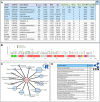The DisGeNET knowledge platform for disease genomics: 2019 update
- PMID: 31680165
- PMCID: PMC7145631
- DOI: 10.1093/nar/gkz1021
The DisGeNET knowledge platform for disease genomics: 2019 update
Abstract
One of the most pressing challenges in genomic medicine is to understand the role played by genetic variation in health and disease. Thanks to the exploration of genomic variants at large scale, hundreds of thousands of disease-associated loci have been uncovered. However, the identification of variants of clinical relevance is a significant challenge that requires comprehensive interrogation of previous knowledge and linkage to new experimental results. To assist in this complex task, we created DisGeNET (http://www.disgenet.org/), a knowledge management platform integrating and standardizing data about disease associated genes and variants from multiple sources, including the scientific literature. DisGeNET covers the full spectrum of human diseases as well as normal and abnormal traits. The current release covers more than 24 000 diseases and traits, 17 000 genes and 117 000 genomic variants. The latest developments of DisGeNET include new sources of data, novel data attributes and prioritization metrics, a redesigned web interface and recently launched APIs. Thanks to the data standardization, the combination of expert curated information with data automatically mined from the scientific literature, and a suite of tools for accessing its publicly available data, DisGeNET is an interoperable resource supporting a variety of applications in genomic medicine and drug R&D.
© The Author(s) 2019. Published by Oxford University Press on behalf of Nucleic Acids Research.
Figures







References
-
- Rath A., Olry A., Dhombres F., Brandt M.M., Urbero B., Ayme S.. Representation of rare diseases in health information systems: the orphanet approach to serve a wide range of end users. Hum. Mutat. 2012; 33:803–808. - PubMed
Publication types
MeSH terms
LinkOut - more resources
Full Text Sources
Other Literature Sources
Molecular Biology Databases

